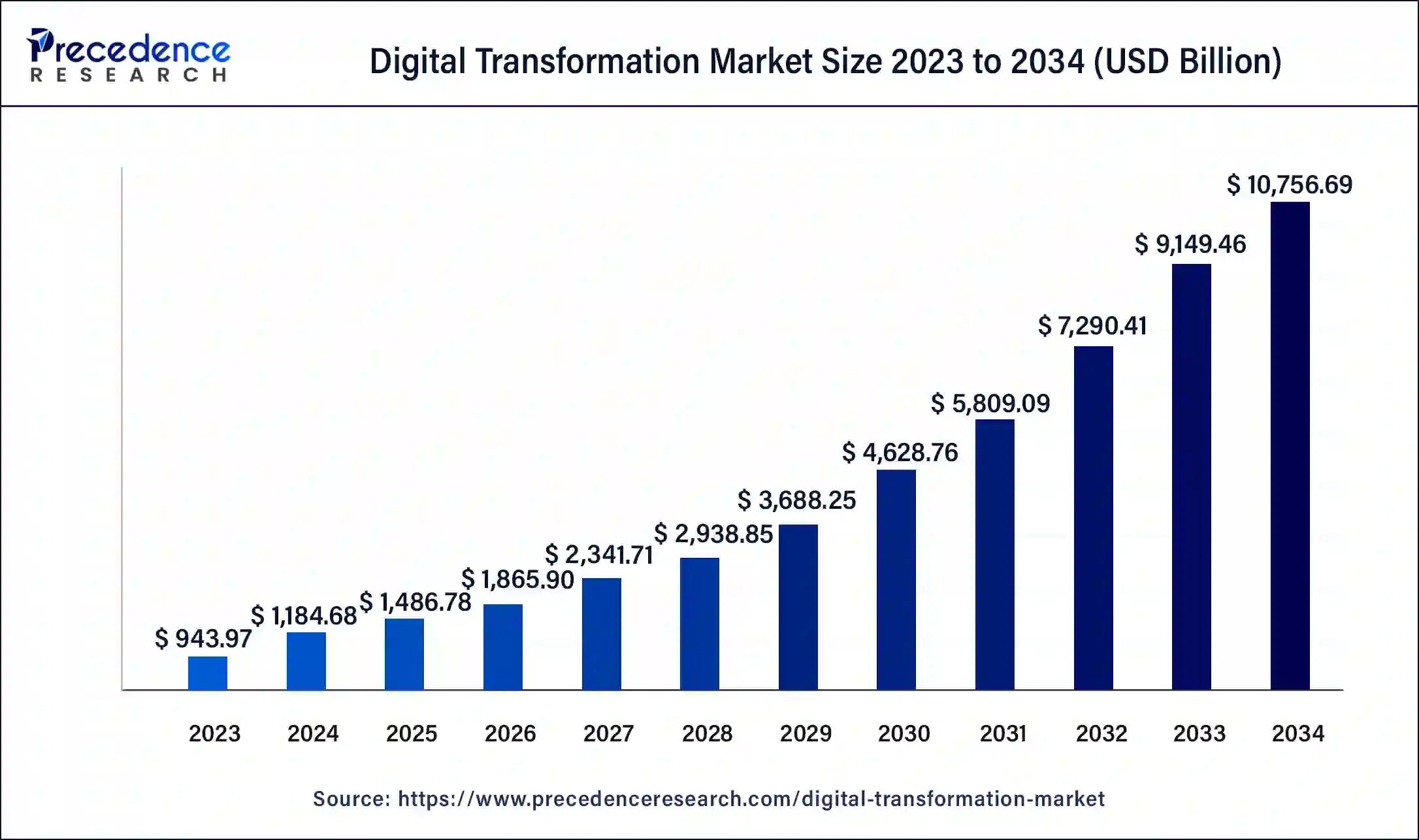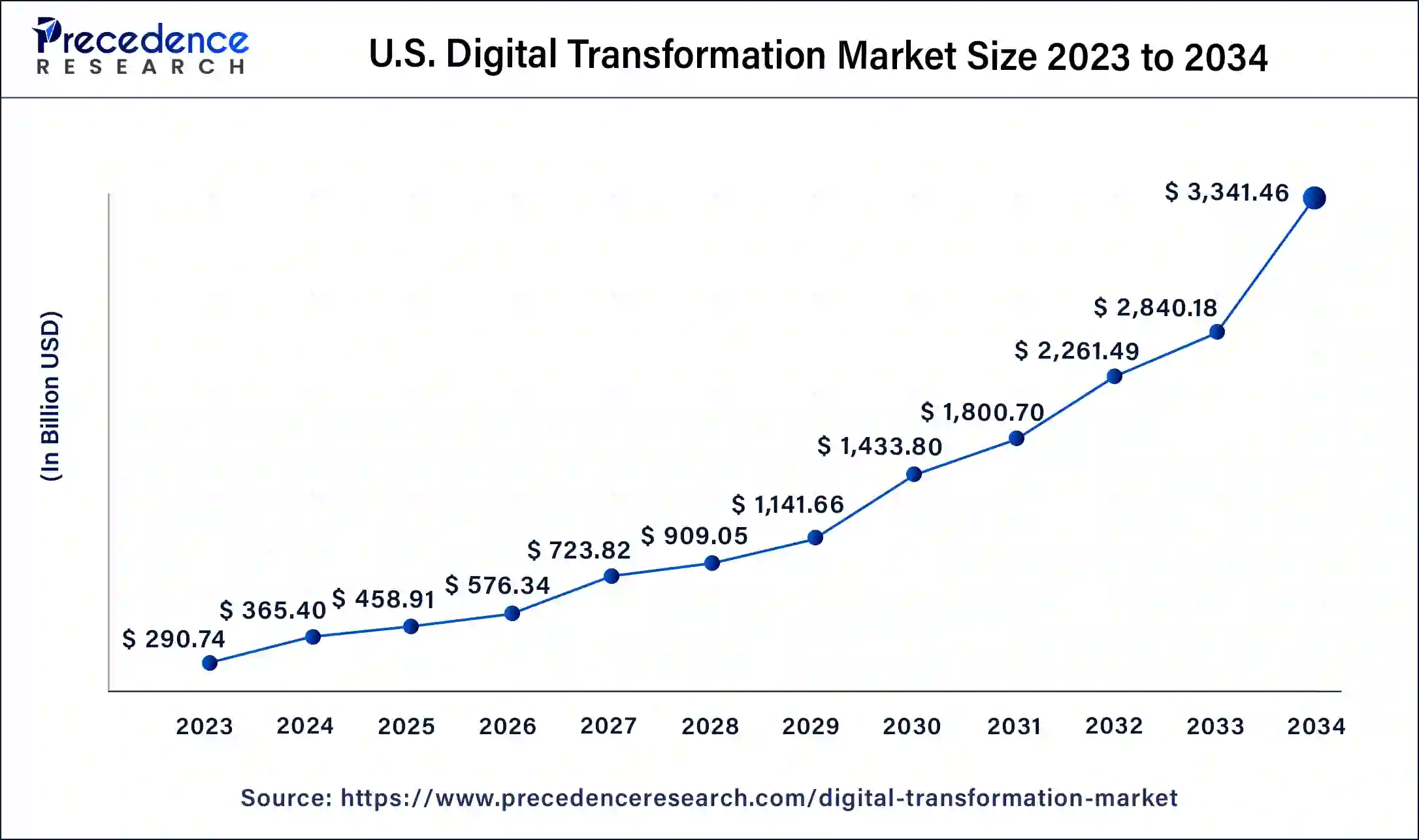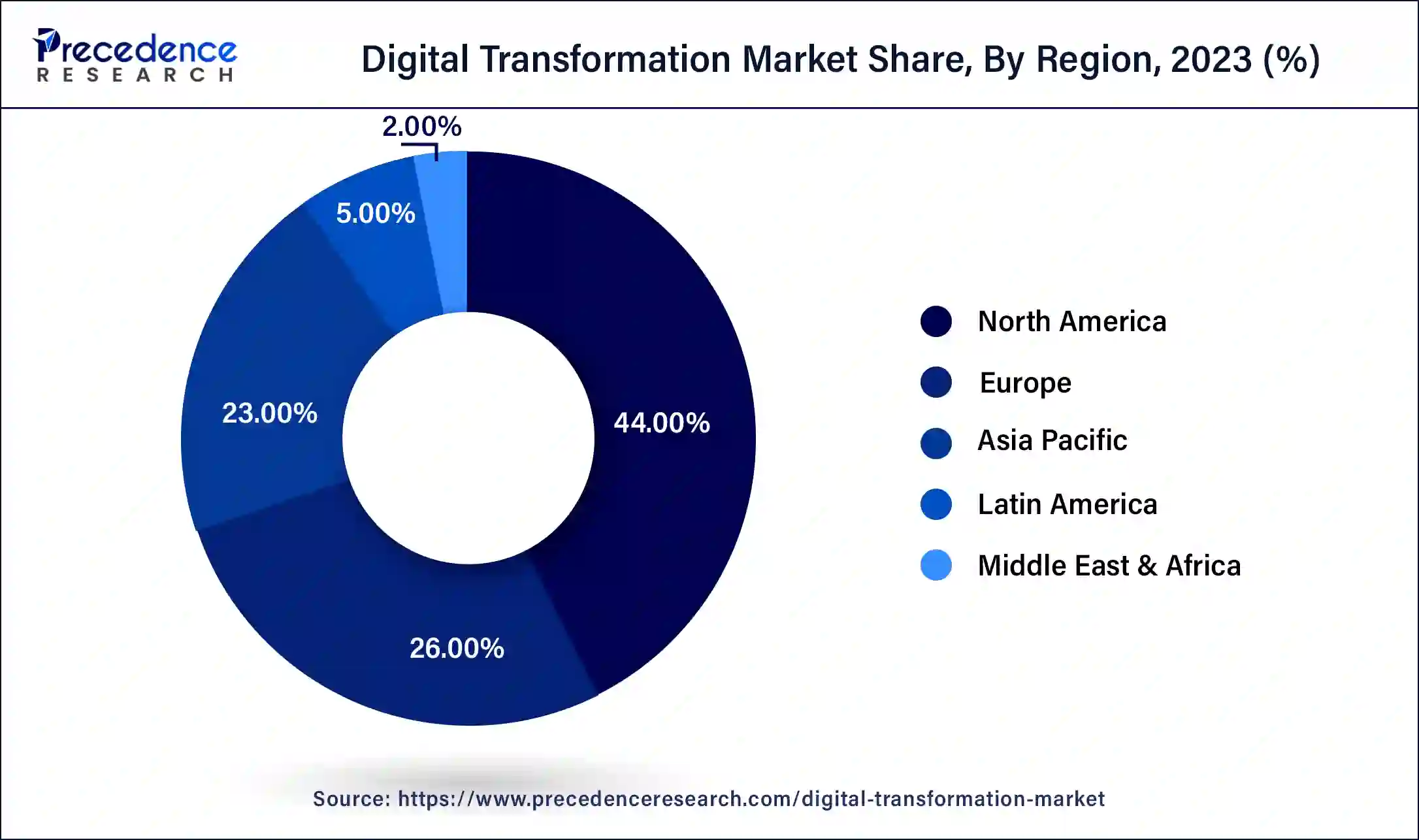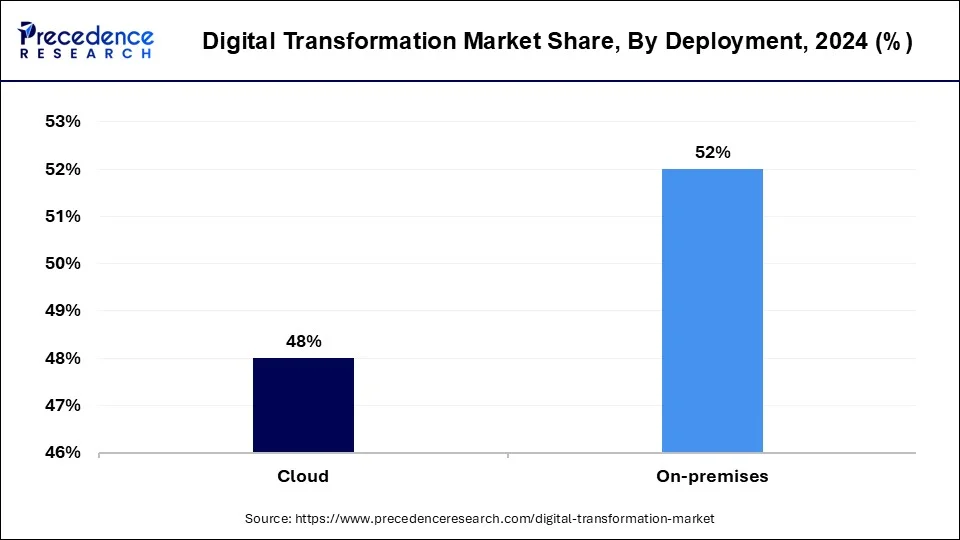March 2025
The global digital transformation market size accounted for USD 1.18 trillion in 2024 and is predicted to reach around USD 10.76 trillion by 2034, growing at a CAGR of 24.74% from 2025 to 2034.

The U.S. digital transformation market size was estimated at USD 365.4 billion in 2024 and is predicted to be worth around USD 3,341.46 billion by 2034, at a CAGR of 24.77% from 2025 to 2034.

North America garnered a market share of around 44% and dominated the global digital transformation market in 2024. The higher demand and adoption rate of the digital and innovative automation technologies in North America has fostered the growth of the market. The increased usage of the online payment systems in the retail sectors has significant contributions in the growth of the North America digital transformation market. Moreover, the increasing government initiatives to promote the adoption of the automation and digital technologies in the healthcare, automotive, and pharmaceutical sector is further fueling the North America digital transformation market. The rapid penetration of the e-commerce in the Canada and US is expected to sustain the significance of the region in the forthcoming years.
The U.S. dominates the digital transformation market in North America because of a large IT infrastructure, early adoption of the cloud, and advancements in AI and IoT. Enterprises in every industry are focusing on digital strategies to improve efficiencies and engage customers. Strong investment in research and development provides a reason for positive industry growth and investment in deploying cutting-edge digital tools. The United States does have an increasing number of large organizations, causing competitive pressure in the tech ecosystem regardless of organization size.
The United States digital transformation market is experiencing a major change, fundamentally altering the way companies function and interact with their clients. Motivated by the increasing need for enhanced customer experiences, companies throughout the United States are quickly embracing cutting-edge technologies like artificial intelligence (AI), cloud computing, and the Internet of Things (IoT). These advancements allow businesses to streamline processes, improve service provision, and tailor customer interactions—ultimately raising satisfaction and fostering long-term loyalty. Digital transformation serves as an essential priority for governments globally, and in the United States, the need for modernization was particularly evident during the Covid-19 pandemic. To meet this demand, the U.S. federal government has initiated various digital programs designed to enhance public services. A significant instance is the launch of digital driver's licenses on smartphones. These allow people to safely utilize their ID without requiring a physical card, making processes such as identity verification and travel easier.

Asia Pacific is estimated to be the fastest-growing market in the foreseeable future. Asia Pacific is witnessing rapid industrialization and urbanization. The higher adoption of the automation and the digital technologies across various industries is expected to drive the market growth. Moreover, the rising government investments in the countries like China and India for the development of infrastructure and the development of smart cities is expected to drive the demand for the digital transformation systems in the region.
China is in the leading position for digital transformation as a region because of the developments in 5G, artificial intelligence (AI), and cloud computing technology. There is also extensive support from a domestic technology industry base, which is driving adoption in the manufacturing, finance, and retail industries. The "Digital China" plan, introduced by the Chinese government in 2023, sets forth a two-step approach for the nation’s digital transformation. Furthermore, there is strong demand for emerging solutions from China's large population makes digital transformation initiatives accelerate. Amidst this demand, new age technology (e.g., smart technology) and a rapidly emerging digital infrastructure, the need for final solutions is strong.
"Delivering superior quality in a digital landscape" is DHL's approach for 2025. The COVID-19 pandemic has accelerated the company's initiatives for digital transformation. Allocating more than $2 billion towards digital transformation initiatives from 2021 to 2025.
Disney introduced Disney+, bought significant entertainment properties, and focused extensively on personalization. An instance of digital personalization is the MyMagic+ wristbands given to park visitors. The wristbands feature integrated RFID chips that enable individuals to pay for services, reserve rides, unlock hotel rooms, and more. These data streams can then be utilized for tailored services.
Caterpillar, known as CAT, is the top global producer of construction and mining machinery. Renowned for its loaders, dozers, excavators, and trucks. Recently, the multinational has transformed into a hardware-and-software firm, pioneering advancements in A.I. and digital twins.
The rising penetration of industry 4.0, the demand for the automated and digital technologies across the manufacturing industry has surged rapidly in the past few decades. The manufactures are increasingly adopting the latest technologies to automate and digitalize the process to enhance the product quality and productivity. The rising demand for the latest and advanced technologies such as big data analytics, artificial intelligence, internet of things, and cloud computing across various business enterprises is significantly driving the growth of the global digital transformation market. These latest technologies helps to integrate intelligence into business activities and promotes customer engagement while offering operational efficiency. The rising penetration of internet, increasing adoption of smartphones, and developing IT and telecommunications infrastructure across the globe are some of the major indicators that boosts the growth of the digital transformation market across the globe. The companies across all the industries are heavily investing to increase their digital presence. Therefore, the shift from traditional business to digital business is significantly augmenting the growth of the global digital transformation market.
Digital transformation allows the business entities to enhance operations, create a brand reputation, improves customer experiences, and improves the customer retention. The adoption of the digital technologies can help the businesses to counter any change in the technical landscape and can resist the shifts in industry. For instance, the digital businesses were highly profitable during the outbreak of the COVID-19 pandemic. Most of the businesses across various industries suffered huge losses due to the lockdown situation and they were forced to invest heavily on the digitization of their operations. Therefore, the outbreak of the COVID-19 pandemic has positively and significantly impacted the growth of the global digital transformation market. The rapid adoption of the wireless connectivity, internet, and cloud computing is expected to change the way different industries used to operate. The BFSI, healthcare, retail, education, and pharmacies are some of the industries that are estimated to foresee a drastic change due to the growing importance of internet and smart devices.
| Report Coverage | Details |
| Market Size by 2034 | USD 10.76 Trillion |
| Market Size in 2025 | USD 1.49 Trillion |
| Market Size in 2024 | USD 1.18 Trillion |
| Growth Rate from 2025 to 2034 | CAGR of 24.68% |
| Largest Market | North America |
| Base Year | 2024 |
| Forecast Period | 2025 to 2034 |
| Segments Covered | Technology, End Use, Deployment, and Region |
| Regions Covered | North America, Europe, Asia-Pacific, Latin America, and Middle East & Africa |
The internet of things (IoT) dominated the global digital transformation market in 2024. This is attributed to the increased adoption of the internet of things technology across various industry verticals such as automotive, healthcare, and manufacturing industries. The digital transformation helps these industries to enhance their operational efficiency and improve their system error timings. Moreover, the healthcare sector is witnessing rapid adoption of the IoT due to the rising government initiatives to digitalize the hospitals and for the development of smart hospitals across the globe.
The blockchain is estimated to be the most opportunistic segment during the forecast period. The blockchain technology offers certain benefits to the businesses such as enhanced security, higher transparency, instant traceability, facilitates automation, and increases speed and efficiency. These benefits of the blockchain is creating a huge demand across various industries such as healthcare, insurance, banking, entertainment, travel and logistics, and retail. Therefore, the blockchain is expected to grow at the highest CAGR during the forecast period.
The BFSI segment dominated the global digital transformation market, garnering a market share of around 30% in 2024. The top players in the BFSI industry are adopting the digital technologies to enhance their services and offer improved customer experiences and customer engagement. The increased adoption of the online and digital payment platforms across the globe has forced the BFSI industry to invest increasingly on the digital transformation.
On the other hand, the healthcare is estimated to be the fastest-growing segment during the forecast period. The rising prevalence of chronic diseases and growing geriatric population across the globe is resulting in the higher volume of patients. The rising adoption of the telehealth, rising implementation of various digital technologies in the hospitals, and development of smart hospitals are some of the most prominent factors that are estimated to drive the growth of this segment.
The on-premises segment accounted for market share of around 52% and dominated the global digital transformation market in 2024. The on-premises deployment offers easy customization, which is a major factor behind the growth of this segment. Moreover, the easy compliance with the government regulations and high security associated with the on-premises deployment has fueled the market growth.

The cloud computing is estimated to be the most opportunistic segment during the forecast period. The cheaper cost, ease of data accessibility, and easy data transfer are the significant features of the cloud computing which is expected to drive the growth of this segment during the forecast period.
The digital transformationmarket is moderately fragmented with the presence of several local companies. These market players are competing to strengthen their market position by adopting strategies, such as partnerships, acquisitions, new product launches, and collaborations. Companies are also spending on the development of enhanced and efficient products. Moreover, they are also focusing on maintaining competitive pricing.
By Technology
By End User
By Deployment
By Enterprise
By Geography
For inquiries regarding discounts, bulk purchases, or customization requests, please contact us at sales@precedenceresearch.com
No cookie-cutter, only authentic analysis – take the 1st step to become a Precedence Research client
March 2025
January 2025
January 2025
May 2025